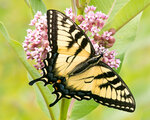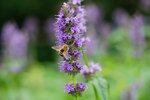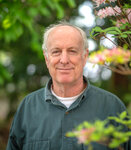


The warmer temps and spring blooms have many Rhode Islanders excited to get their hands in the dirt and start filling garden beds and yards with new plants. Before taking up a trowel and watering can, consider attending Transforming the Landscape, a native plants and pollinators symposium hosted by the Audubon Society of RI (ASRI) to help gardeners of all experience levels make informed decisions about growing with the ecosystem in mind. Renowned author Doug Tallamy will serve as the keynote speaker, answering audience questions and signing copies of Nature’s Best Hope, and he’ll be in good company with the area’s top scientists in the urban ecosystem field.
“Garden and community spaces can be life-giving habitats,” notes Katie Schortmann, the pollinator outreach coordinator of ASRI. “Everyone starts by learning!” At the symposium, attendees can see demonstrations about protecting our local watershed, learn native plant gardening tips and where to find pesticide-free flowers locally, join advocacy efforts protecting pollinators, and engage with the community to create actionable change.
Understanding the harm many landscaping industry practices have on wildlife is the first step in reimagining outdoor spaces. For instance, many consumers may not know about the harms of neonicotinoid pesticides, or neonics, which “have been demonstrated to target the nervous system of insects, leading to an inability to forage effectively,” explains Schortmann. “Our native pollinator populations are in steep decline and these dangerous chemicals are found on up to 30 percent of plants sold at big box stores – even those labeled with bees and butterfly graphics. Plants grown with neonics can continue to negatively impact your garden ecosystem for years.”
Along with shopping local nurseries for neonic-free native plants, home gardeners can tweak their growing practices in small ways to benefit the wildlife we live alongside. Schortmann explains that “70 percent of wild bee species nest underground. Disturbing them too early with leaf blowing and early spring planting can leave them exposed and destroy their burrows.” Choosing native plants also supports pollinator cycles. “It takes thousands of caterpillars to raise one clutch of chickadees to flight. No host plants, no caterpillars. No caterpillars, no butterflies,” says Schortmann. Removing invasive plants and nurturing trees like willows and oaks also benefits pollinators.
At the symposium, those interested can also learn more about Audubon’s Pollinator Alliance, and get their garden on the map. “The database will allow Audubon to see where there are healthy corridors for wildlife and help us target our efforts in policy, education, and outreach,” says Schortmann. “By protecting and connecting habitat, we can provide insects and birds with the desperately needed space they need to thrive.” The Pollinator Alliance also connects participants with plant and seed sellers and other pollinator protectors in the area.
Whether you’re still finding your green thumb or looking to make a big impact in your local ecosystem, Transforming the Landscape offers resources and talks all attendees will find useful. Says Schortmann, “They will be reminded about all the creatures that live near their home, or would like to, if given the chance!”
Register online for the April 20 symposium, which takes place 9am-4pm at the Donovan Dining Center at Rhode Island College, 600 Mount Pleasant Avenue, Providence.
Comments
No comments on this item Please log in to comment by clicking here